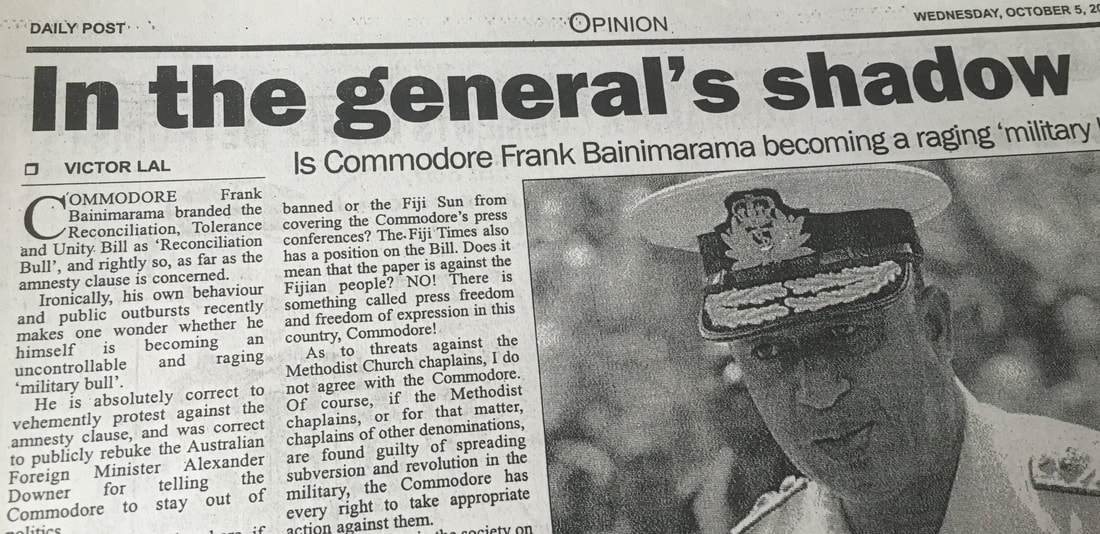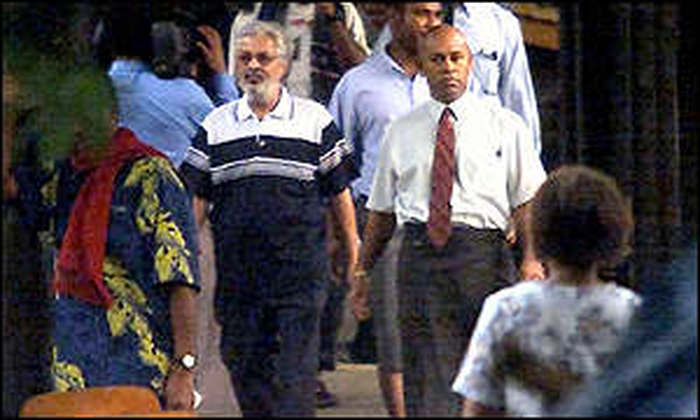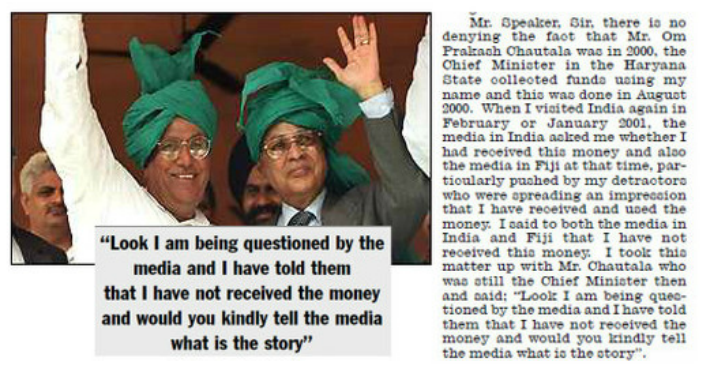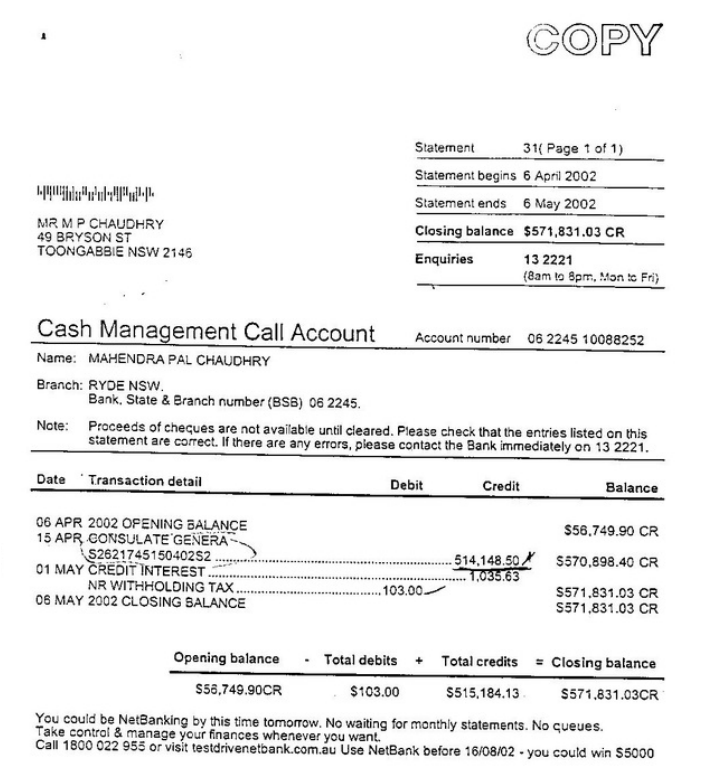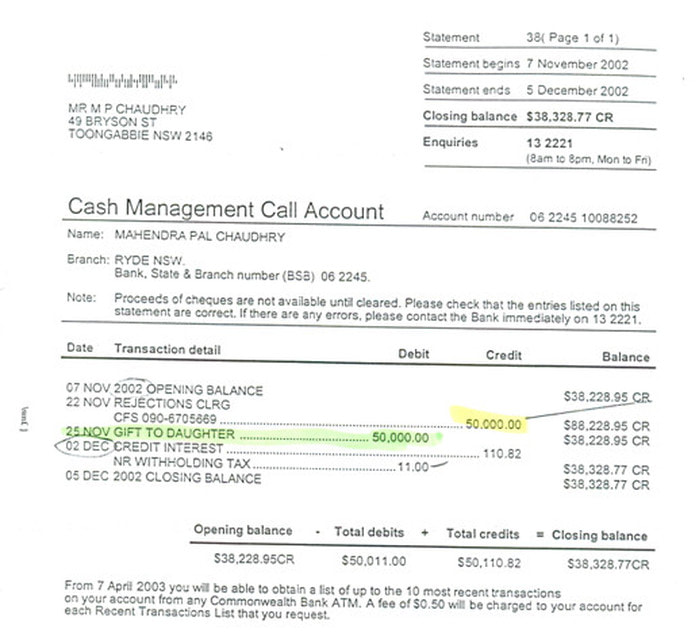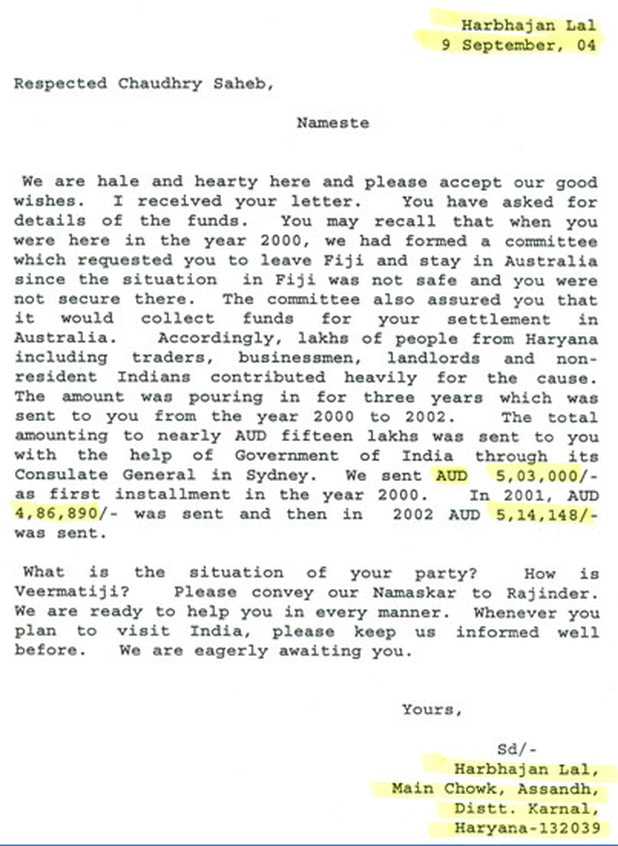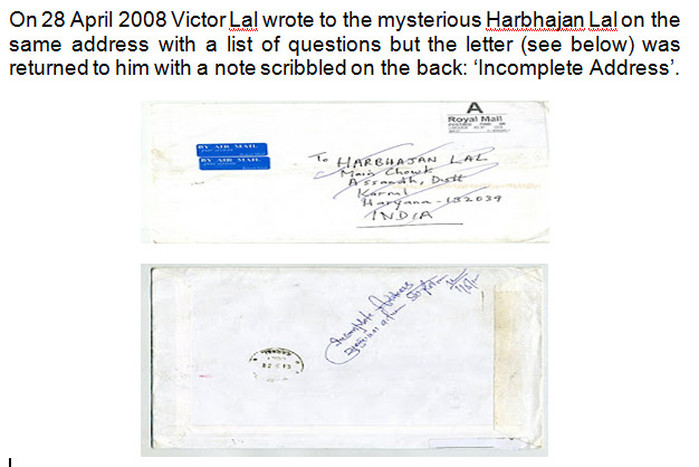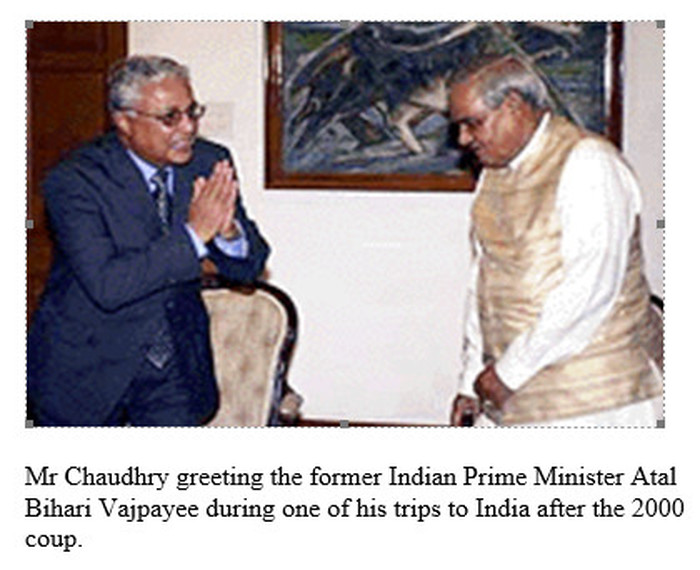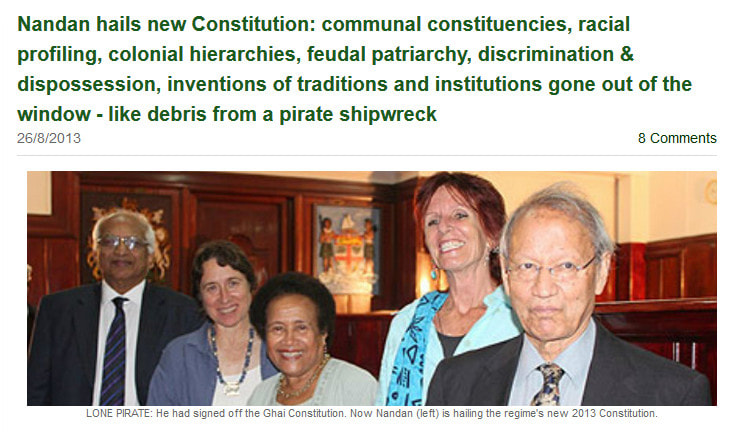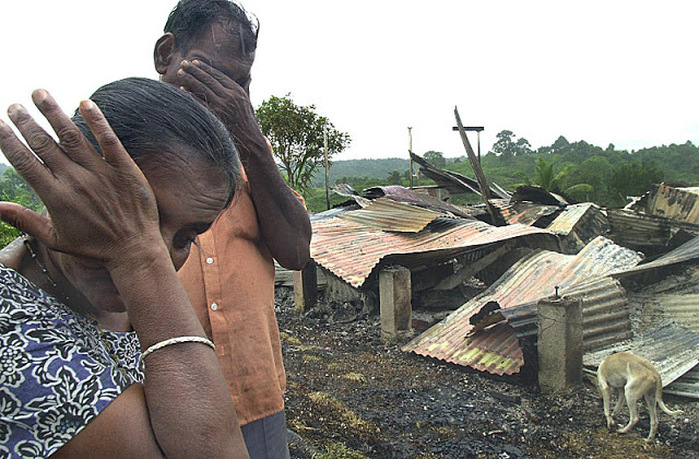
October 28, 2016
MEDIA RELEASE
Prime Minister and Fiji First Party Leader Voreqe Bainimarama is insulting the intelligence of the people of Fiji by labeling the National Federation Party as racist just because the Party champions the interests of the cane growers.
Speaking to FBC TV News on Wednesday night (26th October) the Prime Minister said his Fiji First Party would not form a coalition with another party for 2018 general elections because “their policies don’t align”.
He also stated that “that the National Federation Party now is not the same as the NFP of old” and furthermore said, “I would think that the NFP party now is a racist party that’s why they all in the cane fields because of the vote of the Indo-Fijians. Their policies are totally at the extreme nowadays.”
Nothing can be further from the truth. The Prime Minister, if he believes his warped logic must now answer the following: -
These are legitimate questions that the Prime Minister must now answer truthfully and he must do so by applying the same logic that he did in labeling NFP a racist party.
His political character and credibility now faces the litmus test.
Authorised by: -
Hon Professor Biman Prasad
NFP Leader
MEDIA RELEASE
Prime Minister and Fiji First Party Leader Voreqe Bainimarama is insulting the intelligence of the people of Fiji by labeling the National Federation Party as racist just because the Party champions the interests of the cane growers.
Speaking to FBC TV News on Wednesday night (26th October) the Prime Minister said his Fiji First Party would not form a coalition with another party for 2018 general elections because “their policies don’t align”.
He also stated that “that the National Federation Party now is not the same as the NFP of old” and furthermore said, “I would think that the NFP party now is a racist party that’s why they all in the cane fields because of the vote of the Indo-Fijians. Their policies are totally at the extreme nowadays.”
Nothing can be further from the truth. The Prime Minister, if he believes his warped logic must now answer the following: -
- Does he know that almost 30% of cane growers are Fijians of i-Taukei descent?
- Is he refusing to accept sound and sensible solutions proposed by the NFP to resuscitate the sugar industry and improve the livelihood of cane growers because he thinks upholding the interest of growers who comprise of 70% Indo-Fijians and who are descendants of the Girmitiya is racism
- Does this mean that the Prime Minister who is the Minister for i-Taukei Affairs is a racist because the Ministry exclusively looks after the interests of our i-Taukei community?
- Does this also mean that the Prime Minister, who was Commander of Republic of Fiji Military Forces for 15 years, an organisation whose personnel are almost exclusively i-Taukei, is a racist?
- Does this mean that just because the elite arm of RFMF (CRW Unit) helped George Speight execute the coup in May 2000 to overthrow a Government led by an Indo-Fijian, make the Prime Minister racist because he was Commander of the Army?
- Does this mean that the abrogation of the 1997 Constitution and then Commander Bainimarama’s refusal to re-instate the Fiji Labour Party Leader as Prime Minister following the end to the hostage crisis in 2000 , actions later proven in Court of Appeal to be in defiance of the rule of law was an act of racism?
- And does this mean that when as Commander, Bainimarama executed the coup to topple an i-Taukei led multi-party multiracial Government in December 2006, was yet again a racist act?
These are legitimate questions that the Prime Minister must now answer truthfully and he must do so by applying the same logic that he did in labeling NFP a racist party.
His political character and credibility now faces the litmus test.
Authorised by: -
Hon Professor Biman Prasad
NFP Leader

From The Fiji Sun archive, 2008:
Race politics road to “millionairehood” in Fiji
Chaudhry greatest beneficiary of political racism
By VICTOR LAL
Fiji Sun, 2008
The esteemed and learned academic, Professor Satendra Nandan, an old and dear “comrade” of mine in our long and relentless fight for the last two decade, against the cancer of racism and coups in the country, says Fiji is a racist state, and that some people have benefited a lot by transforming racial thinking into a political art. He forgot to add that racism could also be a silky road to richness in Fiji, especially for those Indo-Fijian leaders whom “Mother India” considers as one of her own.
The case in point is that of Mahendra Pal Chaudhry, who lost power in a racist coup but who became an overnight secret double-digit millionaire from the debris of racism. Who says racism does not pay in Fiji?
The Fiji Labour Party leader was able to acquire the $2million dollar status because “Mother India” continued to regard him as one of her own, and he allowed himself to be treated as her own, despite his family being rooted in Fiji since 1912. But, it must be pointed out, that in Mr Chaudhry’s case, he is also an exception; for a part of his family still live in Haryana, and he only recently visited his niece Madhu Chaudhry’s home, while leading a three-member delegation of the Fiji government to hold talks with Indian leaders including Prime Minister Manmohan Singh.
During the 2000 hostage crisis, it was Madhu Chaudhry who on behalf of the family, called on the then Hindu right-wing BJP Prime Minister Atal Behari Vajpayee to send Indian commandos to Fiji to free Mr Chaudhry from the clutches of George Speight, and restore the ousted Peoples Coalition government. “These people are savages,” she said at the time. “These people should be killed”. No effort, it seems, had been made to educate her and other Indians that savagery and cannibalism was now a thing of the past in Fiji.
The 2000 coup, with overt racist tone, had put Mr Chaudhry’s ancestral Haryana village in the international spotlight. And he was adopted as “The Son of Haryana”. In August 2000, Mr Chaudhry arrived in New Delhi on a 10-day visit at the invitation of Prime Minister Vajpayee. He had gone to India to drum up support for the restoration of democracy and human rights in Fiji. His cause was greatly helped by the BJP government and its political allay in Haryana, Om Prakash Chautala.
In May 2000, when Mr Chaudhry was held hostage, Mr Chautala had written to Mr Vajpayee and the then UN Secretary-General, Kofi Annan, seeking their intervention for the restoration of democracy in Fiji and for the safety of Mr Chaudhry. In his letter to Mr Vajpayee, Mr Chautala had expressed his grave concern over the manner in which the Indo-Fijian community had been sidelined Fiji. He had impressed upon Mr Vajpayee to safeguard the interests of the Indo-Fijians as otherwise, it might send a wrong signal for the safety of Indians settled in other countries. As Mr Chaudhry hailed from Haryana, the people were particularly concerned about his safety, and he wanted Mr Vajpayee to convey the Haryana state and its peoples’ sentiments about Mr Chaudhry’s safety to Mr Anan.
Mr Chaudhry, according to Indian news reports, was given a hero’s welcome at Rothak in Haryana, where welcome arches and flag-waving school children greeted Mr Chaudhry. He was feted at a public reception by Mr Chautala’s Haryana state government. His struggle in Fiji was likened to the then South African President Nelson Mandela’s crusade against apartheid in old racist South Africa.
In his speech, according to Indian newspaper reports, Mr Chaudhry told a cross-section of politicians and a gathering of up to 8,000 people who had turned up to cheer him, that his struggle to restore democracy in Fiji would be fraught with danger because the guns were still in the hands of rebels who had overthrown his Peoples Coalition Government. “I have not received such a reception at home,” Mr Chaudhry told the crowd. “For a moment it appeared as if I was in my own political constituency.”
On 28 August 2000, two days after Mr Chaudhry’s planned departure from India, Mr Chautala announced the formation of an Indo-Fijian Friendship Society, to be constituted under the patronage of Mr Chaudhry. Mr Chautala said the society would make efforts to restore democracy in Fiji. He asked all Haryana residents to donate one Indian rupee each as a token of respect for Mr Chaudhry, whose ancestors hailed from Rohtak district in the Haryana state. Mr Chautala had fixed a target of Rs.16 million for the Indo-Fijian Fund, which is equal to the state’s population. He said the money would be collected by elected representatives of “panchayat” (village councils) and municipal committees and would be deposited in the society's bank account.
To cut the story short, Mr Chaudhry claimed in Parliament on 2 December 2005 that he never received a cent from Mr Chautala, but neither did he disclose that he had secretly received $2million from one Harbhajan Lal, a part of the money transferred through the Indian Consulate-General in Sydney? In Parliament, Mr Chaudhry claimed to have discovered only during his 2005 visit to India that Mr Chautala’s record with money was not transparent. “My anger about the whole episode is that Shri Chautala should exploit the feelings of the ordinary and poor folks of Haryana who are emotionally tied to me and to the people of Indian origin in Fiji and play on them a game of deceit for self enrichment,” Mr Chaudhry said. What link did Mr Chaudhry employ to get the $2million?
It was sixty years ago when, in 1948, the first Prime Minister of independent India, Pandit Jawaharlal Nehru, raised the issue of citizenship, including that of Indo-Fijians, in the Indian parliament. He had repeatedly stressed that “integration” was the key to the survival of “Overseas Indians” in the foreign lands. He told them bluntly to identify themselves with the colonies in which they had settled.
On 8 March 1948, Mr Nehru told the Indian Parliament: “Now these Indians abroad…Are they Indian citizens…or not? If not, then our interest in them becomes cultural and humanitarian, not political. Take the Indians of Fiji or Mauritius: are they going to retain their nationality, or will they become Fiji nationals or Mauritians? The same question arises in regard to Burma and Ceylon. This House wants to treat them as Indians, and with the same breath it wants a complete franchise for them in the countries where they are living. Of course, the two things do not go together. Either they get the franchise as nationals of the other country, or treat them as Indians minus the franchise and ask for them the most favourable treatment given to an alien.”
One of the basic barriers to successful race relations in Fiji has been the wrong signal successive Indian governments’ and its high commissioners to Fiji (the exception being Bhagwan Singh) have conveyed to the Indo-Fijians and their leaders that India will stand or fall with them because they are India’s “overseas children”.
Of course, there is nothing wrong in having divided loyalties but as I have consistently maintained, India must be only allowed to involve herself culturally and religiously with the Indo-Fijians, and not politically (some would even argue, economically). The official Indian position has always been “Its Fiji’s internal matter”, but privately, historically, and from personal experience, it has always been a secretive meddlesome country in the affairs of Fiji. Whenever an Indo-Fijian sneezes from the South Pacific chill, Mother India catches fever.
Professor Nandan, who was a victim of the 1987 coups, has described the 2006 coup as a necessary evil and one that is lesser of the two evils. This coup, he reckoned, is the coup that will wipe off all coups. He claimed that although the coup maybe illegal or unconstitutional, it is ethical and moral. We should not be surprised by his comments, for after all, he has described the Qarase government, comprising of SDL-FLP Cabinet ministers, as “racial terrorism”.
It seems there is a twisted logic rife among certain sections of the Indo-Fijian community and their leaders, and it is as follows: the 1987 coups ushered in untold suffering and racism against the Indo-Fijian community, so if they are to correct or prevent further racism against the community, another coup is a “necessary evil”. In other words, only an anti-taukei Fijian coup is the only guarantor of their survival in Fiji.
I thought the great inspirational Indian leader Mahatma Gandhi is on record as saying that “an eye for an eye, makes the world go blind”.
But, maybe, certain sections of the Indo-Fijian community and their leaders have now contracted the coup culture virus, and are totally blind and immune to the havoc the coup is inflicting on the nation and to race relations in the country.
On the other hand, surely, some would be tempted to become double-digit millionaires from the cancer of racism, especially when “Mother India” might be willing to stuff $2million in their pockets, because she refuses to treat the Indo-Fijians as Nehru’s “foreign aliens” in Fiji.
And some Indo-Fijian leaders want to continue to cling to the “saree” of “Mother India”, despite their ancestors having permanently left behind their “dhotis” in their ancestral homeland when they signed up as indentured labourers for Fiji, beginning in 1879.
As for those holding onto power through the barrel of the gun, it is worth reminding them of Professor Nandan’s own message to them, although he was writing against the 1987 coups, in his Requiem for a Rainbow: A Fijian Indian Story: “The only hope is that they who sit on the bayonets cannot be comfortable for too long. “The curse, the curse”, Kurtz could have cried.”
In another book, Fiji: Paradise in Pieces, Professor Nandan wrote of Mr Chaudhry during his (Mr Chaudhry’s) incarceration at the hands of George Speight: “Because Chaudhry is an extraordinary organiser and campaigner, almost in the Gandhian tradition, the greatest asset he knows are a country’s people. As soon as he’s out of the clutches of the brutal, gun-toting clowns, he’ll be rebuilding his political base with a steely passion and renewed hope.”
Professor Nandan could not have forecast that Mr Chaudhry would be also $2million richer from the actions of the same “brutal, gun-toting clowns” holding Mr Chaudhry in the name of their taukei Fijian race. Racism, certainly, could be an economic windfall for some Indo-Fijian leaders.
It is time the Indian government, the Indian High Commission here, and the Indo-Fijian leaders, took heed of Mr Nehru’s advice: the Indo-Fijians must choose to be Indians in Fiji or Fiji Indians.
The Indo-Fijian leaders and their followers, including India, cannot have it both ways.
What Mr Nehru said in 1948 is still relevant, sixty years later, in 2008.
The views expressed are those of Victor Lal and not that of the Fiji Sun. E-mail: [email protected]. Fijileaks: Victor Lal stopped using this e-mail account after it was hacked in 2008 following his revelation that Mahendra Chaudhry had $2million in his Australian bank account.
Race politics road to “millionairehood” in Fiji
Chaudhry greatest beneficiary of political racism
By VICTOR LAL
Fiji Sun, 2008
The esteemed and learned academic, Professor Satendra Nandan, an old and dear “comrade” of mine in our long and relentless fight for the last two decade, against the cancer of racism and coups in the country, says Fiji is a racist state, and that some people have benefited a lot by transforming racial thinking into a political art. He forgot to add that racism could also be a silky road to richness in Fiji, especially for those Indo-Fijian leaders whom “Mother India” considers as one of her own.
The case in point is that of Mahendra Pal Chaudhry, who lost power in a racist coup but who became an overnight secret double-digit millionaire from the debris of racism. Who says racism does not pay in Fiji?
The Fiji Labour Party leader was able to acquire the $2million dollar status because “Mother India” continued to regard him as one of her own, and he allowed himself to be treated as her own, despite his family being rooted in Fiji since 1912. But, it must be pointed out, that in Mr Chaudhry’s case, he is also an exception; for a part of his family still live in Haryana, and he only recently visited his niece Madhu Chaudhry’s home, while leading a three-member delegation of the Fiji government to hold talks with Indian leaders including Prime Minister Manmohan Singh.
During the 2000 hostage crisis, it was Madhu Chaudhry who on behalf of the family, called on the then Hindu right-wing BJP Prime Minister Atal Behari Vajpayee to send Indian commandos to Fiji to free Mr Chaudhry from the clutches of George Speight, and restore the ousted Peoples Coalition government. “These people are savages,” she said at the time. “These people should be killed”. No effort, it seems, had been made to educate her and other Indians that savagery and cannibalism was now a thing of the past in Fiji.
The 2000 coup, with overt racist tone, had put Mr Chaudhry’s ancestral Haryana village in the international spotlight. And he was adopted as “The Son of Haryana”. In August 2000, Mr Chaudhry arrived in New Delhi on a 10-day visit at the invitation of Prime Minister Vajpayee. He had gone to India to drum up support for the restoration of democracy and human rights in Fiji. His cause was greatly helped by the BJP government and its political allay in Haryana, Om Prakash Chautala.
In May 2000, when Mr Chaudhry was held hostage, Mr Chautala had written to Mr Vajpayee and the then UN Secretary-General, Kofi Annan, seeking their intervention for the restoration of democracy in Fiji and for the safety of Mr Chaudhry. In his letter to Mr Vajpayee, Mr Chautala had expressed his grave concern over the manner in which the Indo-Fijian community had been sidelined Fiji. He had impressed upon Mr Vajpayee to safeguard the interests of the Indo-Fijians as otherwise, it might send a wrong signal for the safety of Indians settled in other countries. As Mr Chaudhry hailed from Haryana, the people were particularly concerned about his safety, and he wanted Mr Vajpayee to convey the Haryana state and its peoples’ sentiments about Mr Chaudhry’s safety to Mr Anan.
Mr Chaudhry, according to Indian news reports, was given a hero’s welcome at Rothak in Haryana, where welcome arches and flag-waving school children greeted Mr Chaudhry. He was feted at a public reception by Mr Chautala’s Haryana state government. His struggle in Fiji was likened to the then South African President Nelson Mandela’s crusade against apartheid in old racist South Africa.
In his speech, according to Indian newspaper reports, Mr Chaudhry told a cross-section of politicians and a gathering of up to 8,000 people who had turned up to cheer him, that his struggle to restore democracy in Fiji would be fraught with danger because the guns were still in the hands of rebels who had overthrown his Peoples Coalition Government. “I have not received such a reception at home,” Mr Chaudhry told the crowd. “For a moment it appeared as if I was in my own political constituency.”
On 28 August 2000, two days after Mr Chaudhry’s planned departure from India, Mr Chautala announced the formation of an Indo-Fijian Friendship Society, to be constituted under the patronage of Mr Chaudhry. Mr Chautala said the society would make efforts to restore democracy in Fiji. He asked all Haryana residents to donate one Indian rupee each as a token of respect for Mr Chaudhry, whose ancestors hailed from Rohtak district in the Haryana state. Mr Chautala had fixed a target of Rs.16 million for the Indo-Fijian Fund, which is equal to the state’s population. He said the money would be collected by elected representatives of “panchayat” (village councils) and municipal committees and would be deposited in the society's bank account.
To cut the story short, Mr Chaudhry claimed in Parliament on 2 December 2005 that he never received a cent from Mr Chautala, but neither did he disclose that he had secretly received $2million from one Harbhajan Lal, a part of the money transferred through the Indian Consulate-General in Sydney? In Parliament, Mr Chaudhry claimed to have discovered only during his 2005 visit to India that Mr Chautala’s record with money was not transparent. “My anger about the whole episode is that Shri Chautala should exploit the feelings of the ordinary and poor folks of Haryana who are emotionally tied to me and to the people of Indian origin in Fiji and play on them a game of deceit for self enrichment,” Mr Chaudhry said. What link did Mr Chaudhry employ to get the $2million?
It was sixty years ago when, in 1948, the first Prime Minister of independent India, Pandit Jawaharlal Nehru, raised the issue of citizenship, including that of Indo-Fijians, in the Indian parliament. He had repeatedly stressed that “integration” was the key to the survival of “Overseas Indians” in the foreign lands. He told them bluntly to identify themselves with the colonies in which they had settled.
On 8 March 1948, Mr Nehru told the Indian Parliament: “Now these Indians abroad…Are they Indian citizens…or not? If not, then our interest in them becomes cultural and humanitarian, not political. Take the Indians of Fiji or Mauritius: are they going to retain their nationality, or will they become Fiji nationals or Mauritians? The same question arises in regard to Burma and Ceylon. This House wants to treat them as Indians, and with the same breath it wants a complete franchise for them in the countries where they are living. Of course, the two things do not go together. Either they get the franchise as nationals of the other country, or treat them as Indians minus the franchise and ask for them the most favourable treatment given to an alien.”
One of the basic barriers to successful race relations in Fiji has been the wrong signal successive Indian governments’ and its high commissioners to Fiji (the exception being Bhagwan Singh) have conveyed to the Indo-Fijians and their leaders that India will stand or fall with them because they are India’s “overseas children”.
Of course, there is nothing wrong in having divided loyalties but as I have consistently maintained, India must be only allowed to involve herself culturally and religiously with the Indo-Fijians, and not politically (some would even argue, economically). The official Indian position has always been “Its Fiji’s internal matter”, but privately, historically, and from personal experience, it has always been a secretive meddlesome country in the affairs of Fiji. Whenever an Indo-Fijian sneezes from the South Pacific chill, Mother India catches fever.
Professor Nandan, who was a victim of the 1987 coups, has described the 2006 coup as a necessary evil and one that is lesser of the two evils. This coup, he reckoned, is the coup that will wipe off all coups. He claimed that although the coup maybe illegal or unconstitutional, it is ethical and moral. We should not be surprised by his comments, for after all, he has described the Qarase government, comprising of SDL-FLP Cabinet ministers, as “racial terrorism”.
It seems there is a twisted logic rife among certain sections of the Indo-Fijian community and their leaders, and it is as follows: the 1987 coups ushered in untold suffering and racism against the Indo-Fijian community, so if they are to correct or prevent further racism against the community, another coup is a “necessary evil”. In other words, only an anti-taukei Fijian coup is the only guarantor of their survival in Fiji.
I thought the great inspirational Indian leader Mahatma Gandhi is on record as saying that “an eye for an eye, makes the world go blind”.
But, maybe, certain sections of the Indo-Fijian community and their leaders have now contracted the coup culture virus, and are totally blind and immune to the havoc the coup is inflicting on the nation and to race relations in the country.
On the other hand, surely, some would be tempted to become double-digit millionaires from the cancer of racism, especially when “Mother India” might be willing to stuff $2million in their pockets, because she refuses to treat the Indo-Fijians as Nehru’s “foreign aliens” in Fiji.
And some Indo-Fijian leaders want to continue to cling to the “saree” of “Mother India”, despite their ancestors having permanently left behind their “dhotis” in their ancestral homeland when they signed up as indentured labourers for Fiji, beginning in 1879.
As for those holding onto power through the barrel of the gun, it is worth reminding them of Professor Nandan’s own message to them, although he was writing against the 1987 coups, in his Requiem for a Rainbow: A Fijian Indian Story: “The only hope is that they who sit on the bayonets cannot be comfortable for too long. “The curse, the curse”, Kurtz could have cried.”
In another book, Fiji: Paradise in Pieces, Professor Nandan wrote of Mr Chaudhry during his (Mr Chaudhry’s) incarceration at the hands of George Speight: “Because Chaudhry is an extraordinary organiser and campaigner, almost in the Gandhian tradition, the greatest asset he knows are a country’s people. As soon as he’s out of the clutches of the brutal, gun-toting clowns, he’ll be rebuilding his political base with a steely passion and renewed hope.”
Professor Nandan could not have forecast that Mr Chaudhry would be also $2million richer from the actions of the same “brutal, gun-toting clowns” holding Mr Chaudhry in the name of their taukei Fijian race. Racism, certainly, could be an economic windfall for some Indo-Fijian leaders.
It is time the Indian government, the Indian High Commission here, and the Indo-Fijian leaders, took heed of Mr Nehru’s advice: the Indo-Fijians must choose to be Indians in Fiji or Fiji Indians.
The Indo-Fijian leaders and their followers, including India, cannot have it both ways.
What Mr Nehru said in 1948 is still relevant, sixty years later, in 2008.
The views expressed are those of Victor Lal and not that of the Fiji Sun. E-mail: [email protected]. Fijileaks: Victor Lal stopped using this e-mail account after it was hacked in 2008 following his revelation that Mahendra Chaudhry had $2million in his Australian bank account.

